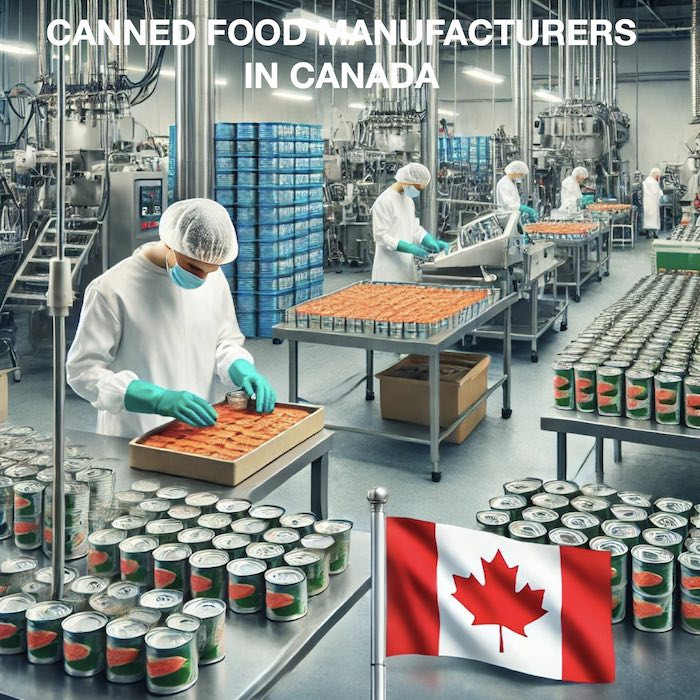| Manufacturers | Canada

The production of canned food in Canada is a significant industry that supports the country’s agricultural, seafood, and manufacturing sectors. The process involves the preservation of food through sealing it in airtight containers, a method that extends shelf life while maintaining nutritional value. Here's a closer look at key aspects of this industry in Canada:
---
1. Major Segments of Canned Food
- Fruits and Vegetables:
- Canada produces a variety of canned fruits (e.g., apples, cherries) and vegetables (e.g., beans, corn, peas) sourced from local farms.
- Ontario and British Columbia are prominent in fruit and vegetable canning due to their agricultural outputs.
- Seafood:
- Canned seafood, particularly salmon, tuna, and shellfish, is a vital part of the industry, especially in provinces like British Columbia and Nova Scotia.
- Canada's rich fisheries ensure a steady supply of seafood for canning.
- Meat and Poultry:
- Canned meats and ready-to-eat meals are growing in popularity.
- These products are often produced in partnership with farms across the country.
- Prepared Meals and Soups:
- Canada is a significant producer of canned soups and prepared meals, with a focus on both domestic and export markets.
2. Key Players
- Large Companies:
- Multinationals like Campbell’s Canada and local giants like Lassonde Industries play a dominant role.
- They specialize in canned soups, beverages, and sauces.
- SMEs:
- Many small and medium enterprises cater to niche markets, including organic and specialty foods.
3. Production Process
- Raw Material Procurement: Ingredients are sourced from local farms, fisheries, and suppliers.
- Cleaning and Preparation: Raw materials undergo washing, peeling, and cutting.
- Canning and Sterilization: Food is placed in cans, sealed, and sterilized using heat to kill bacteria.
- Quality Control: Ensures compliance with Canadian Food Inspection Agency (CFIA) standards.
- Packaging and Distribution: Products are labeled and distributed to retail stores, both domestically and internationally.
4. Industry Trends
- Sustainability:
- The Canadian canned food industry is increasingly focusing on sustainable packaging, such as recyclable aluminum and BPA-free cans.
- Health-Focused Products:
- Growing demand for low-sodium, organic, and preservative-free options.
- Innovation:
- Expansion into gourmet canned foods and ethnic cuisine.
5. Challenges
- Competition with Fresh and Frozen Products:
- Consumers often prefer fresh or frozen options, prompting innovation in canned food quality.
- Rising Costs:
- Inflation, labor costs, and supply chain issues impact production.
- Environmental Concerns:
- The industry must balance efficiency with environmental sustainability.
6. Economic and Export Significance
- The industry contributes significantly to the Canadian economy, providing employment and supporting related sectors like agriculture and fisheries.
- Canada exports canned food to numerous markets, including the U.S., Europe, and Asia.
The canned food industry in Canada continues to evolve with consumer preferences and environmental considerations, ensuring its role as a critical part of the nation's food supply chain.
We are updating the section Canada canned food manufacturers. If your Company producing canned food in Canada has been not yet added here, you are able to inform us here.